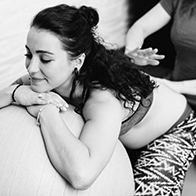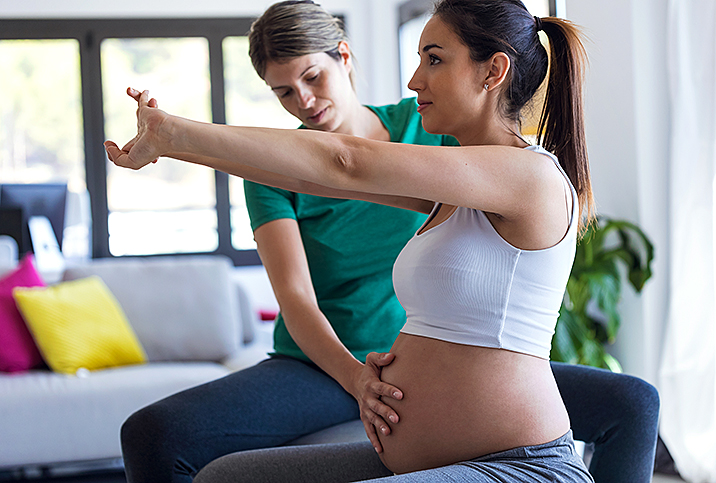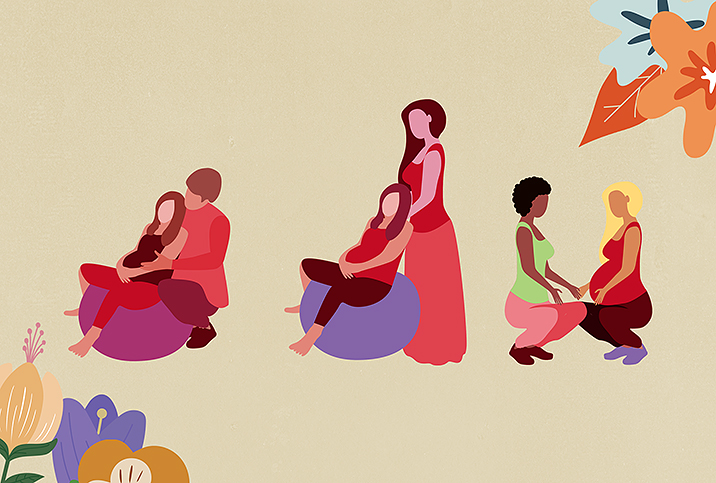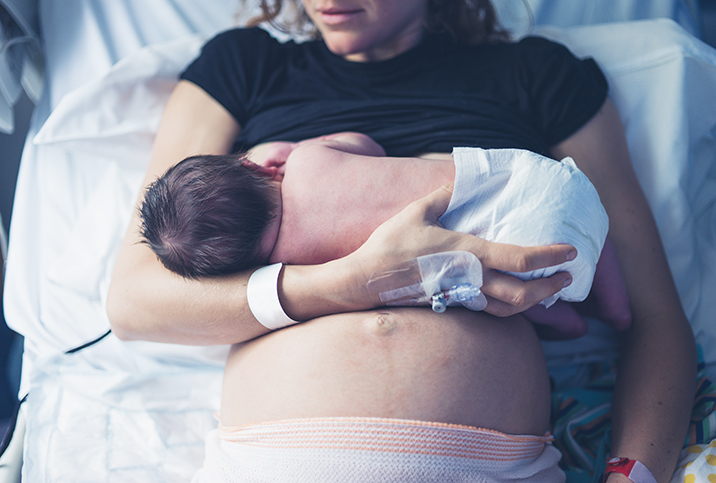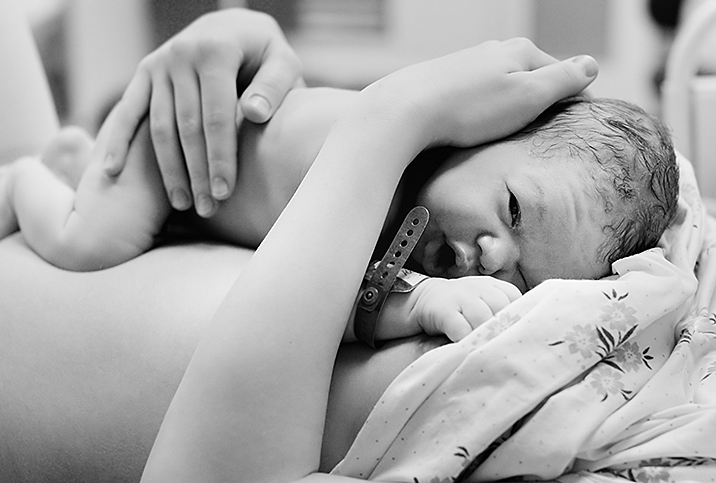What's Normal (and What's Not) With Third Trimester Swelling
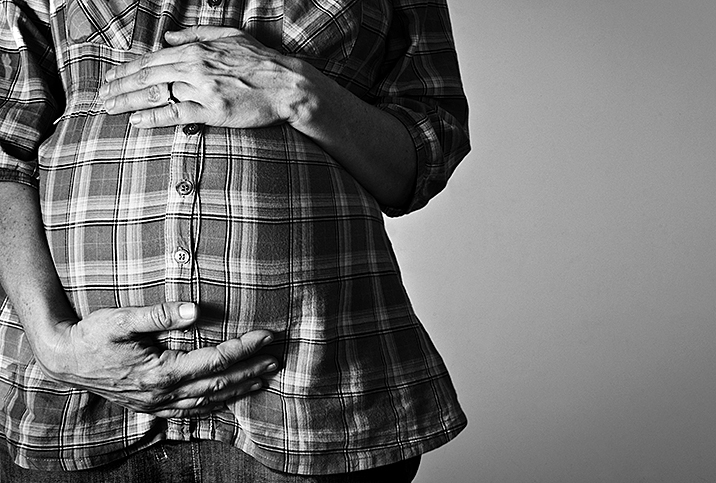
First, there was morning sickness, then there was weight gain and breast tenderness, and now, as your pregnancy creeps into the third trimester, you start to notice your shoes just don't fit the way they used to.
No, you're not imagining things, and no, it's not all attributable to pregnancy-related weight gain. You are, in fact, swelling, and generally speaking, it's another lovely and "normal" side effect of the pregnancy process. Fantastic, right?
That said, some swelling can be a sign of a more serious health issue, so it's important to know what to be on the lookout for and when to call your doctor.
Why third trimester swelling happens
It's no secret your body is undergoing significant changes during pregnancy to support the needs of your growing baby. But it's not just your belly and your boobs that are suddenly taking up more space—your blood and fluid content is growing astronomically as well.
"The composition of blood changes during pregnancy and women tend to hold onto more fluids," explained Betsy Greenleaf, D.O., FACOG, an advisor with pH-D Feminine Health. "In fact, throughout the course of a pregnancy, the fluid component of blood increases by almost a liter and a half."
If you're not up-to-snuff on translating liters into pounds, Greenleaf is saying the fluid in your blood alone increases by about 3 pounds over the course of your pregnancy. And sure, your body is designed to take these changes in stride, but not without some potential side effects (like swelling), that are further punctuated by other pregnancy-related changes.
Basically, your body's creating a lot more fluid and blood to support your baby, but your baby's growing body is pressing on the veins that assist with circulation.
"The weight of the pregnancy pushes on the main veins leading back to the heart, which slows the blood flow in the feet and legs, adding to the risk of swelling," Greenleaf said.
Basically, your body's creating a lot more fluid and blood to support your baby, but your baby's growing body is pressing on the veins that assist with circulation. As such, circulation slows, and fluids can "pool" in your lower extremities, where they're not getting an assist from gravity to help them return to your heart.
So, generally speaking, third trimester swelling, particularly as you close in on your due date, is considered a fairly normal part of the whole pregnancy experience.
When swelling might point to greater problems
"Swelling in the third trimester can be normal as you start to retain fluid or it can be a sign of cardiovascular issues, such as preeclampsia, heart failure or blood clot formation," warned Brittany Robles, an OB-GYN and NASM-certified personal trainer, who runs the website PostpartumTrainer.com.
Robles emphasized non-painful swelling that's equally distributed between both legs, and tends to accumulate and get worse throughout the day, is usually associated with normal increased fluid retention.
But there are situations you should be on the lookout for, Robles said. Contact your doctor immediately if you experience any of the following:
- Rapid weight gain within one to two weeks
- Painful swelling
- Headaches or blurry vision
- Epigastric pain (pain in the upper abdomen under your ribs)
You should also be on the lookout for swelling that's greater on one side than the other, as this could be the sign of a blood clot.
And don't feel embarrassed about getting checked out if you're unsure if your swelling falls into the normal category or not. OB-GYNs expect regular questions from their patients, and given the serious health emergencies swelling could indicate, it's always better to be safe than sorry.
Dealing with normal third trimester swelling
If what you're dealing with is uncomfortable, rather than painful, and all signs point to it being normal swelling, then you're really just in a holding pattern until you give birth to your baby. But that doesn't mean there aren't ways to manage the discomfort.
"We suggest walking as much as you can tolerate, as well as keeping your feet elevated at night," Robles advised. This is because walking (or other forms of cardiovascular exercise) can help promote circulation and prevent excess fluid retention in your feet and legs. Plus, by elevating your feet at night, you're really just taking advantage of gravity, making it easier for your blood to keep moving.
If you find you're still uncomfortable most of the time, take a look at your diet. "Avoid or cut down on salty [foods], which lead to more fluid retention," Greenleaf said. She added you need to stay well-hydrated and drink plenty of water. Though this might seem counterintuitive—why should you drink more when you already feel like an overfilled water balloon?—but when you're dehydrated, your body actually wants to hold onto all the fluid it has, which may increase fluid retention and swelling.
When it comes to staying comfortable, listen to your body and give yourself some self-care. Go ahead and wear your most comfortable, loose-fitting clothing, soak your legs in warm water and Epsom salt, use ice packs in 20-minute intervals and enlist your partner for a leg massage.
Just request they massage up your feet and legs, helping "push" the retained fluid toward your heart, rather than down, toward your toes. This is a great way for your partner to support you and maintain intimacy, especially in the latest stages of pregnancy when everything can feel challenging and overwhelming.
Swelling after your baby arrives
The good news about pregnancy-related fluid retention is it'll go away pretty quickly after your baby arrives. Greenleaf said most swelling should disappear within a couple of days, however, it takes up to 8 weeks after birth for all the blood constituents to return to pre-pregnancy levels, so don't be surprised if a little bit of the swelling sticks around for roughly this long.
Another thing to keep in mind is that the risk of preeclampsia and blood clots remains in the days and weeks following birth. So while a little bit of swelling is still considered normal after your baby arrives, if you notice any of the more serious signs of swelling (painful swelling, swelling accompanied by headaches or changes in vision, or swelling more on one side than the other), contact your doctor right away.
The main thing to remember as your third trimester progresses is that a little bit of discomfort is normal, but any sudden changes or painful and unexpected symptoms should be checked out. And, when your shoes don't fit anymore, switch to flip flops and ride it out. This swelling, too, shall pass, and when it does, you'll be holding your baby in your arms.








